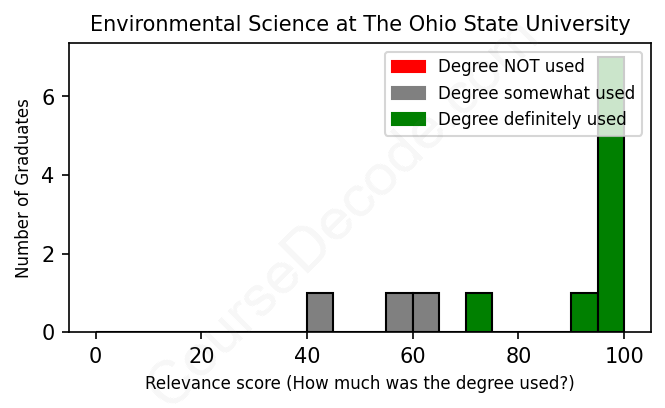
First, some facts. Of the Environmental Science graduates from The Ohio State University we've analyzed , here's how many have used (or NOT used) their degree in their career:

These are estimates based on AI analysis of 12 LinkedIn profiles (see below).
The verdict? Significantly above average. Overall, with an average relevance score of 85%, Environmental Science graduates from The Ohio State University have a much higher likelihood (+18%) of finding work in this field compared to the average graduate across all fields:
And for comparison, here's the chart for all profiles we've looked at across all degrees.
Also, after graduating, only 25% of these graduates have pursued further education other than another Bachelor's degree (such as a Masters degree or other), compared to the average across all profiles of 35%. This suggests a Bachelors degree is enough for most Environmental Science graduates, and it's normal to look for work straight after graduation.
See the details:
|
Relevance score: 100% We think this person has gone into a career highly relevant to their degree. We think this person has gone into a career highly relevant to their degree.
DEGREE INFOGraduated in 2010 from The Ohio State University with a Bachelor of Science (BS) in Environmental Science. Also pursued further education since (see below). JOB HISTORY SINCE GRADUATIONResearch Assistant The Ohio State University Aug 2012 - Jun 2013 Environmental Specialist  Ohio EPA Mar 2014 - Present FURTHER DEGREES DONE SINCE GRADUATINGMaster of Science (MS)The Ohio State University 2010 - 2012 ABOUTNo information provided. |
The top 10 most common jobs done by the graduates we've analyzed (ranked most common to least) are:
After analyzing the LinkedIn profiles of graduates from The Ohio State University with a degree in Environmental Science, it's clear that the most common job roles tend to be Environmental Scientists, Specialists, and Technicians. Many individuals find themselves in positions like Environmental Technician or Environmental Scientist, working directly with environmental regulations, data collection, and assessments. These roles often require a deep understanding of the principles learned during their studies, making them quite relevant to their degree. For example, jobs at organizations like the Ohio EPA and various environmental consulting firms show how graduates apply their skills in real-world contexts related to ecology, conservation, and policy-making.
However, not all positions they hold are closely linked to Environmental Science. Some graduates work in roles like servers or in sales, which don't demand expertise in environmental topics. While some of these positions in business or operations may tangentially benefit from an environmental background, they don't directly involve the major’s core concepts. Overall, it seems like the majority of these graduates land roles that are either directly or somewhat related to Environmental Science, showing that there's a strong link between their education and career paths, though there are exceptions, especially in entry-level roles or internships where the relevance may vary widely.
Here is a visual representation of the most common words in job titles for Environmental Science graduates (this is across all Environmental Science graduates we've analyzed, not just those who went to The Ohio State University):

When you look at the career trajectories of graduates with a degree in Environmental Science from The Ohio State University, there's a noticeable trend toward sustainability-focused and environmental roles. Many of the alumni seem to land their first jobs in positions that are directly related to environmental science, such as environmental technicians, specialists, and researchers. For example, recent grads have worked at places like the Ohio EPA, which shows that they're getting their foot in the door with respected organizations that prioritize environmental conservation and policy. This is definitely a good sign right out of school!
Fast forward five or ten years, and many of these individuals continue to build on their foundation, taking on roles like environmental scientists and water quality technicians. Some have even climbed the ladder to positions like Director of Operations or starting their own businesses, demonstrating their versatility and ambition. However, it’s not all roses. A few have taken jobs that seem disconnected from their degree, like working in landscaping or being a server, especially in the early years after graduation. Overall, though, most of the graduates appear to be finding meaningful work in their field, which suggests that an Environmental Science degree from The Ohio State University can lead to solid, relevant career paths.
Getting a Bachelor’s degree in Environmental Science at The Ohio State University can be a mix of challenges and rewarding moments. It’s not necessarily the hardest degree out there, but it definitely comes with its own set of tough classes, especially around things like ecology, chemistry, and data analysis. You'll need to be good at both science and a bit of math, and there can be a fair amount of fieldwork and group projects that require teamwork. If you enjoy the outdoors and are passionate about environmental issues, it can feel easier and more engaging than other majors, but if science isn't your strong suit, you might find it a bit challenging. Overall, if you're into environmental topics and willing to put in the effort, it's definitely manageable!
Most commonly, in the LinkedIn profiles we've looked at, it takes people 4 years to finish a Bachelor degree in Environmental Science.
It looks like the Environmental Science graduates from The Ohio State University have had a mixed bag when it comes to making decent money. While some of the students have climbed the ladder with titles like Environmental Specialist and Director of Operations, suggesting they might be pulling in a pretty good salary, others, particularly the recent grads, have been stuck in intern or entry-level positions that usually don’t pay much. For instance, positions like ‘Landscaper/Hardscaper’ and ‘Fisheries Technician’ are not typically high-paying, and it might take a while for some of these newer graduates to land more lucrative roles. Overall, there’s potential for decent earnings, especially with more experience, but it seems like most of these grads might be starting off on the lower end of the pay scale.
Here is a visual representation of the most common words seen in the "about" section of LinkedIn profiles who have a Bachelor degree in Environmental Science (this is across all Environmental Science graduates we've analyzed, not just those who went to The Ohio State University). This may or may not be useful:

Here are all colleges offering a Bachelor degree in Environmental Science (ordered by the average relevance score of their Environmental Science graduates, best to worst) where we have analyzed at least 10 of their graduates:
| College | Score | Count |
|---|---|---|
 University of North Carolina at Chapel Hill University of North Carolina at Chapel Hill
|
87 | 10 |
 The Ohio State University The Ohio State University
|
85 | 12 |
 University of Vermont University of Vermont
|
68 | 13 |
 University of Oregon University of Oregon
|
66 | 10 |
 Western Washington University Western Washington University
|
63 | 14 |
 University of Virginia University of Virginia
|
57 | 15 |
 Oregon State University Oregon State University
|
56 | 11 |
 Loyola University Chicago Loyola University Chicago
|
56 | 11 |
 Southern New Hampshire University Southern New Hampshire University
|
53 | 15 |
 University of Phoenix University of Phoenix
|
46 | 15 |
 Florida State University Florida State University
|
45 | 16 |